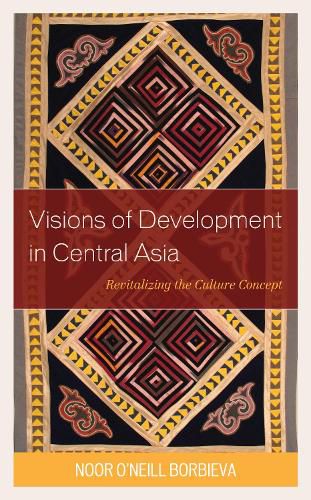Readings Newsletter
Become a Readings Member to make your shopping experience even easier.
Sign in or sign up for free!
You’re not far away from qualifying for FREE standard shipping within Australia
You’ve qualified for FREE standard shipping within Australia
The cart is loading…






In Visions of Development in Central Asia: Revitalizing the Culture Concept, Noor O'Neill Borbieva reflects on anthropology’s withdrawal from discussions about culture and the parallel rise of the intellectually and politically problematic discourse of culture matters thinking, or CMT. CMT asserts that cultures are homogeneous and that the dominant values of its culture determine a state’s socioeconomic and political trajectories. Drawing on practice theory, ecological psychology, complexity science, and poststructuralism, Borbieva urges anthropologists to revisit debates about culture in order to counteract the influence of simplistic formulations such as CMT. Through an examination of ethnographic material from Kyrgyzstan, gathered during the years she worked as a Peace Corps Volunteer and as an anthropologist, Borbieva examines how debates about culture shaped the development sector’s agenda in Central Asia. She argues that mainstream discussions of culture not only misunderstand the cultural basis of human diversity but also threaten that diversity by promoting a one-size-fits-all vision of well-being. Borbieva suggests an alternative vision, one that recognizes the profound complexity of human sociality and embraces the many forms of human thriving that grow out of our cultural differences.
$9.00 standard shipping within Australia
FREE standard shipping within Australia for orders over $100.00
Express & International shipping calculated at checkout
In Visions of Development in Central Asia: Revitalizing the Culture Concept, Noor O'Neill Borbieva reflects on anthropology’s withdrawal from discussions about culture and the parallel rise of the intellectually and politically problematic discourse of culture matters thinking, or CMT. CMT asserts that cultures are homogeneous and that the dominant values of its culture determine a state’s socioeconomic and political trajectories. Drawing on practice theory, ecological psychology, complexity science, and poststructuralism, Borbieva urges anthropologists to revisit debates about culture in order to counteract the influence of simplistic formulations such as CMT. Through an examination of ethnographic material from Kyrgyzstan, gathered during the years she worked as a Peace Corps Volunteer and as an anthropologist, Borbieva examines how debates about culture shaped the development sector’s agenda in Central Asia. She argues that mainstream discussions of culture not only misunderstand the cultural basis of human diversity but also threaten that diversity by promoting a one-size-fits-all vision of well-being. Borbieva suggests an alternative vision, one that recognizes the profound complexity of human sociality and embraces the many forms of human thriving that grow out of our cultural differences.